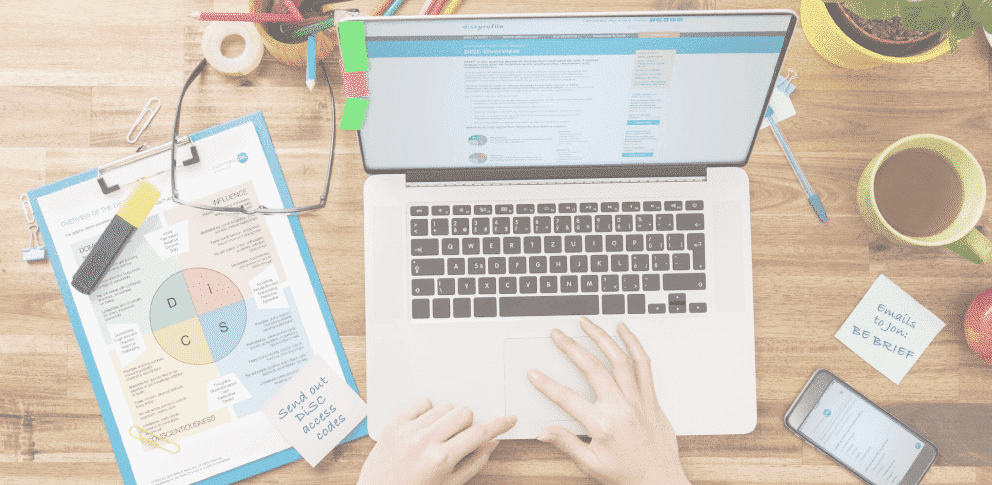
Handling Difficult Participant Behavior in DiSC trainings
In any training there may be times when you have to deal with disruptive or difficult behavior, such as participants who like to share a lot, side conversations, interruptions, off-subject conversations, personal attacks, or negativity.
As a facilitator, you may need to intervene on occasion. Referencing the ground rules and guidelines may be all that is needed. Something as simple as eye contact or asking for input from another participant may stop undesirable behavior.
Below are a few typical difficult participant behaviors that a DiSC Certified Trainer may experience in their training.
 The Quiet One.
The Quiet One.
Some people are naturally quiet, and others become quiet in a seminar setting. While you should not expect these people to change dramatically, you may be able to help them participate more than they would otherwise. As we mentioned earlier, watching for nonverbal clues is one method. For other people, you may have to use your judgment to gauge how comfortable they are with participating.
The Talker.
As a facilitator, you have to strike a balance between giving the participants the freedom and staying on schedule with your seminar topics. Once in a while, you may encounter a participant who tries to monopolize the group’s time. After allowing this individual enough time to make his or her point, firmly but courteously move along to the next topic. For example:

– “Tom, you may not have realized that we still need to hear from Joe and Cate. If we have time, we’ll come back to you and hear more.”
The Bored One.

Too many participants acting this way can have a negative effect on the morale and enthusiasm of the group. The best way to reduce this kind of behavior is to draw these people into the group by recognizing them and asking for their contributions.
 The Arguer.
The Arguer.
A disagreement among participants can be constructive or damaging, depending on the issue and how the disagreement is handled. At all costs, you should avoid letting someone cause you to lose your temper.
As the facilitator, you can set an example of how to argue. You can reduce tension if you disagree with the statement rather than with the person making the statement. Consider this retort: “Tom, I totally disagree with you.” Would this reduce tension?
A more constructive response would be “Tom, you present an interesting argument. There is one part that is still difficult for me to understand. Could you elaborate on…..”
 The “Know-It-All.”
The “Know-It-All.”
People may appear to have a lot of information because they are, in fact, knowledgeable or because they want to win attention or gain approval. Seminar participants will react to “know-it-alls” according to their own needs. Some will be grateful for the information, while others may feel threatened by a display of knowledge they do not have themselves.
People who have a lot of useful knowledge on the subject can be very helpful to the group as long as they do not use that information to monopolize the time. If necessary, thank these people for the information they have provided; then ask for additional comments from other people in the group.
 The Glum One.
The Glum One.
Have you ever noticed the kind of expression people have when sitting in a group listening to someone talk? You will notice when you are the one talking. Look around and you will notice that some participants have rather glum, unsmiling expressions on their faces. This is important only when you happen to be the one toward whom the glum expression is directed.
It’s natural to take the dour expressions personally. But remember that everyone has a mask they wear under certain conditions. That mask may not necessarily reflect how people are feeling at the moment. Accept that glum expressions are normal for many people in a seminar setting.
The previous descriptions are not intended to cover the full range of behaviors you may come into contact with on a seminar setting. They will help alert you, however, to the wide variety of behaviors you may experience from seminar participants.
As a facilitator, use your flexibility to adapt to each person in the group according to his or her behavior. The participants will appreciate your sensitivity, and the sessions will run more smoothly.
Know Yourself
Each participant has a certain style of behavior. You also have a particular way of behaving. Like others, you have been conditioned to react to your environment in certain characteristic ways. Your style will be one factor in determining the training methods you are most comfortable using.
You cannot totally change your style, but you can modify your behavior for limited periods of time when necessary. To be an effective facilitator, you may have to “flex” your behavior so that you can meet the needs of a broad range of individuals.
The guidelines in this article can hopefully help you become a more effective facilitator. However, no one can instantly adapt to all types of participants and put these suggestions into practice. A major part of learning comes from doing. You, too, will learn by actually conducting the training sessions. An effective facilitator does not need to be perfect in every way. You do not need to be a speech major, psychologist, or an expert on personality and behavior. What you do have to be is sensitive to the requirements of participants in your group. Prepare yourself for the session and focus on the strengths and capabilities of the participants. Have confidence in yourself.
You might also be interested in




 The Quiet One.
The Quiet One. The Arguer.
The Arguer. The “Know-It-All.”
The “Know-It-All.” The Glum One.
The Glum One.

